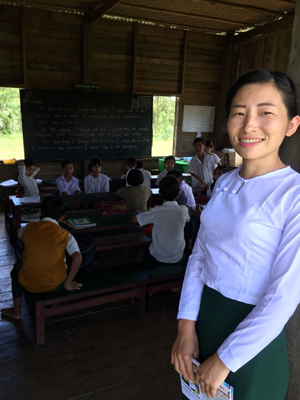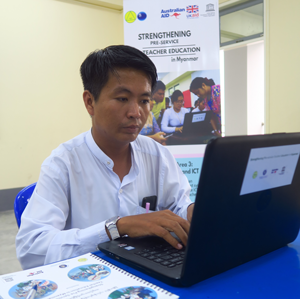Development assistance in Myanmar

Overview
Education is the flagship of Australia's aid program in Myanmar. Our investments are enhancing human development by improving access to quality education, through support to schools, teacher training and scholarships. Our investments recognise that addressing barriers to quality education helps to build a peaceful and prosperous society and contributes to Myanmar's democratic transition.
Related initiatives
Decentralising Funding to Schools Project
$84 million, 2014-2021
Working in partnership with Myanmar's Ministry of Education and the World Bank, Australia is supporting 47,500 government schools through grants that increase operational spending and encourage schools to undertake school improvement planning and increase community participation, benefiting more than 10 million students. Through this program, Australia has enabled nearly 193,000 disadvantaged students (53.6 per cent girls) to continue their schooling.
To address the inexperience among Myanmar's teachers, Australian aid has increased its focus on the quality of teaching. DFSP implemented an in-service teacher-mentoring program, which sees experienced teachers providing guidance and support during visits to schools.
Related link
Australia is proud to be supporting the Myanmar Ministry of Education in a new initiative to provide less experienced teachers in-service professional development. This support is provided through the Decentralising Funding to Schools Project ($84m, 2014-2021).
Teacher Mentors have been recruited, trained and deployed by the Ministry of Education into 80 townships across Myanmar covering all States and Regions. In the 2018/19 school year an additional 70 townships will also be included in the program – meaning a total of approximately 600 mentors.
Four mentors are assigned to each township and are paired with approximately 40 mentees working in diverse schools. Mentees are selected based on their experience in the classroom and level of qualification – they often have less than five years of experience and no formal qualifications. Schools may be located in urban areas but are more often schools in rural and difficult to reach areas where provision of support for teachers and schools is challenging.
Mentors try and visit their mentees at least every two months for a face to face coaching session. They come prepared to share ideas and tools to help support less experienced teachers with techniques for managing their classroom. This commitment means they spend most of their time travelling on the road between remote villages and communities.
The Myanmar Education Consortium (MEC)
$35.5 million, 2013-2021
Around 600,000 children do not have access to government education in Myanmar. Australia is helping these children to access monastic and complementary education and improve the standard of education within these systems. MEC is focused on strengthening complementary education systems and encouraging steps towards an inclusive national education system. MEC supports policy dialogue between the Ministry of Education and complementary education providers on important issues affecting learning in the classroom, such as language of instruction. Australia's partnership with the United Kingdom and Denmark adds to the delivery of this support.
Related documents*
| Name of document | Year published | Type |
|---|---|---|
| Myanmar Education Consortium (MEC) Mid term review and final report | 2015 | Review/report |
Related links
Myanmar Education Quality Improvement Program (My-EQIP)
$20 million, 2017-2020
My-EQIP is a partnership between the Governments of Myanmar and Australia that aims to drive an efficient and effective education system to achieve better learning outcomes. The program will help Myanmar strengthen monitoring and evaluation of education services to inform better education policy, planning, budgeting and management.
Related documents*
| Name of document | Year published | Type |
|---|---|---|
| Mid-Term Review of the Myanmar Education Quality Improvement Program | 2020 | Mid-term evaluation and management response |
Strengthening Pre-Service Teacher Education in Myanmar (STEM) Phase II
$3.0 million, 2018-2020
Australia is supporting Phase II of the STEM program, which aims to improve Myanmar's pre-service teacher education system through policy and institutional capacity development in Myanmar's 25 Teacher Education Colleges (ECs). The Project will provide technical support to the Ministry of Education for the reform of the pre-service teacher education system.
Related documents*
| Name of document | Year published | Type |
|---|---|---|
| Review of the Strengthening pre-service Teacher Education in Myanmar (STEM) project | 2017 | Mid-term review and management response |
|
Strengthening Pre-service Teacher Education in Myanmar (STEM) project |
2019 | Mid-term evaluation and management response |
Related links
Case study: Strengthening Pre-Service Teacher Education in Myanmar (STEM)
Zaw Thet Aung is an ICT Tutor at Taunggoo Education College and a member of the Curriculum Core Team (CRT). CRT is a group of teacher educators supported to upgrade pre-service Teacher Education Colleges in Myanmar from a 2-year diploma to a 4-year degree as part of Australia and UNESCO's "Strengthening Pre-Service Teacher Education in Myanmar" project. Implementation of the project is through the Myanmar Ministry of Education with additional support from Finland and the United Kingdom. Funding from Australia has given Zaw Thet Aung the opportunity to enhance his curriculum development skills while also gaining access to the technology needed to put the new curriculum into action.
In a country where rote memorization has been the norm for decades, Zaw Thet Aung is now using information and communication technology (ICT) to instruct his student teachers using student-centered and interactive teaching methods. By using tablets, provided by Australia, to engage student teachers in-group work and formative assessment he is able to produce lesson plans with the laptop he received from the project. Zaw Thet Aung uses these classroom experiences to contribute to the development of the new pre-service teacher education ICT curriculum and the competency standards framework for ICT in teacher education.
Zaw Thet Aung is also now contributing to an online learning portal where student teachers will be able to access online resources and course modules. With these advances in ICT, Zaw Thet Aung attests to a new enthusiasm among student teachers for learning and using ICT.
* The Department of Foreign Affairs and Trade (DFAT) is committed to high standards of transparency and accountability in the management of the Australian aid program through publishing information on our website, including policies, plans, results, evaluations and research. Our practice is to publish documents after the partner government and any other partners directly involved in the delivery of the initiative have been consulted. Not all material published on this site is created by the Australian aid program and therefore not all documents reflect our views. In limited circumstances some information may be withheld for reasons including privacy and commercial sensitivity.


